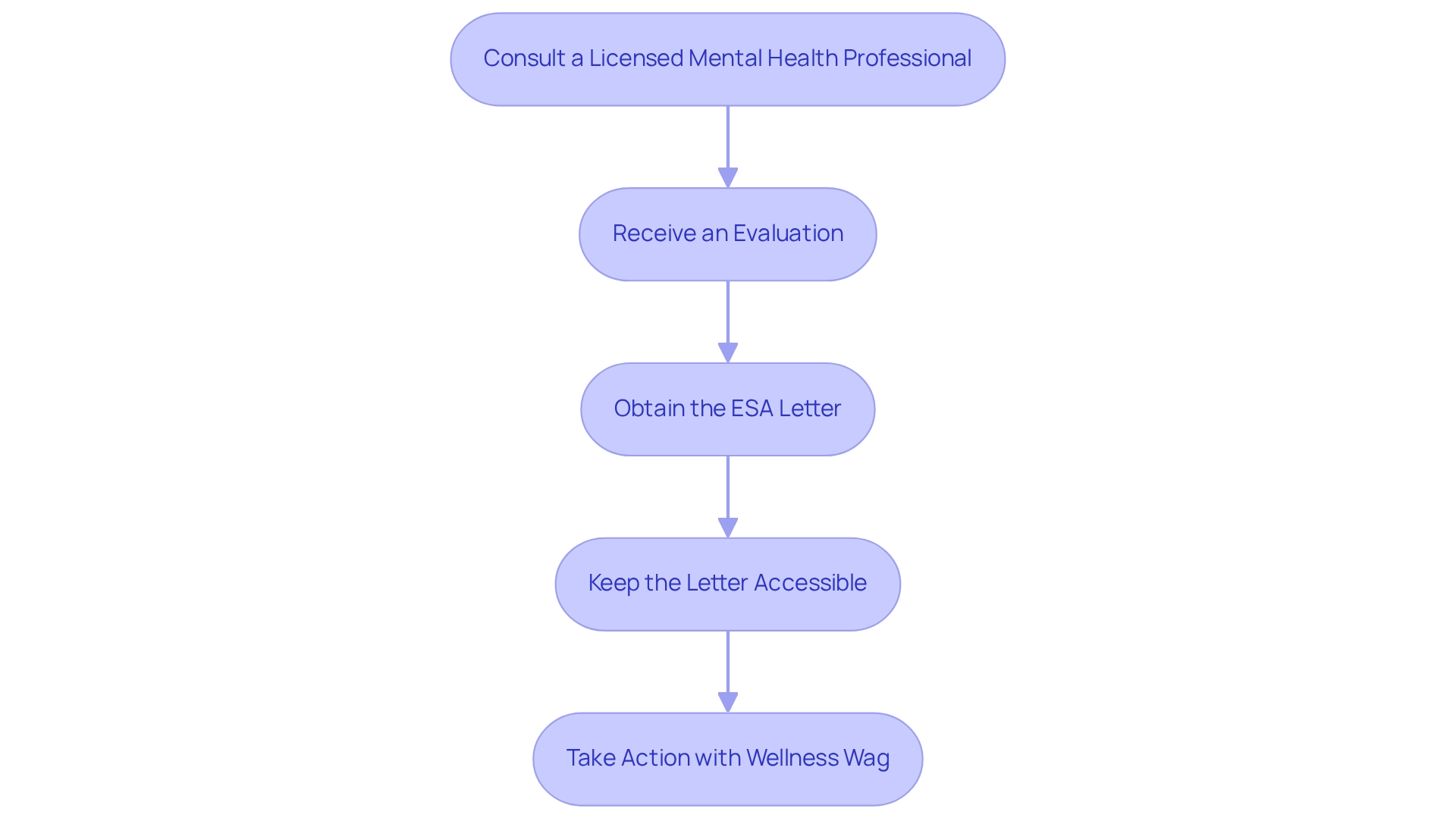

How to Register Emotional Support Animal: A Step-by-Step Guide
by Lena Park
Last updated: July 10, 2025
Verified and Approved by:
Angela Morris,
MSW, LCSW
Fact Checked

Overview
Registering an emotional support animal (ESA) can be a significant step for individuals facing emotional challenges. It begins with a conversation with a licensed mental health professional, who can help assess your emotional needs and provide an official recommendation letter. This letter is not just a formality; it is a crucial part of the registration process that validates your need for support.
Understanding your housing rights and navigating the registration process can be overwhelming. Many individuals feel anxious about ensuring that their ESAs receive the recognition and support they deserve in various environments. This is where the ESA letter plays a vital role, offering reassurance and clarity. It serves as a bridge to the support you need, helping to alleviate some of the burdens you may be experiencing.
Remember, you are not alone in this journey. The emotional support animal community is here to help you through the challenges, ensuring that you have the recognition and support necessary to thrive. With the right guidance and resources, you can find comfort and companionship in your ESA, making a positive difference in your emotional well-being.
Introduction
In a world where mental health challenges are increasingly recognized, many individuals find themselves seeking comfort and stability. The emotional struggles they face, such as anxiety, depression, and PTSD, can be overwhelming. In this context, Emotional Support Animals (ESAs) have emerged as essential companions, offering crucial emotional support that alleviates these symptoms.
While the process of obtaining an ESA may appear straightforward, it often presents challenges that can feel daunting. Understanding legal rights, navigating the registration process, and ensuring proper documentation can be complex. This article aims to shed light on the purpose of ESAs, the eligibility criteria for registration, and the steps to obtain an ESA letter.
Have you ever felt the weight of your mental health challenges? You are not alone. Many individuals are discovering the profound benefits of having an ESA by their side. These animals provide not just companionship but also a sense of stability in tumultuous times.
As we explore the common hurdles faced by those seeking this vital support, we hope to reassure you that help is available. The growing recognition of ESAs in various aspects of life underscores their importance and the comfort they can bring. Remember, you deserve support, and ESAs can be a compassionate solution on your journey to emotional well-being.
Define Emotional Support Animals and Their Purpose
Emotional Support Animals (ESAs) serve as vital companions for individuals grappling with emotional or psychological challenges. Unlike service animals, which are specifically trained to assist individuals with disabilities, ESAs primarily offer companionship and emotional stability. While any animal can qualify as an ESA, dogs and cats are often the preferred choices due to their natural ability to bond with humans. The primary purpose of an ESA is to alleviate symptoms associated with psychological conditions such as anxiety, depression, and PTSD, significantly enhancing the quality of life for their owners.
This distinction is particularly important for those looking to understand how to register an emotional support animal, as it underscores the necessity of obtaining proper documentation to validate their supportive role. Recent research emphasizes the importance of assistance animals in psychological recovery, demonstrating that these beloved companions can profoundly improve emotional well-being and lessen feelings of loneliness. For example, a study titled “The Role of Emotional Support Animals and Service Dogs in Mental Health Care” illustrates how these animals assist individuals in navigating daily challenges, providing comfort and stability during distressing times.
Furthermore, Janet Hoy-Gerlach from The University of Toledo shares, “She is aiding in maintaining my stability,” underscoring the tangible impact of emotional support animals on people’s well-being. However, it is essential to acknowledge the need for further research on the effects of these therapies on mental health recovery, as ongoing studies are necessary to fully grasp their benefits.
Moreover, while various dog breeds, including Labrador Retrievers, Golden Retrievers, German Shepherds, and Poodles, can be trained as service dogs, emotional support animals do not require specialized training to fulfill their role. This distinction highlights the differences in legal rights and access; unlike service dogs, ESAs do not enjoy the same legal protections under the ADA.
The limited availability of guide dogs in China, with only 200 accessible for its visually impaired community, illustrates the global disparity in support animal access and emphasizes the importance of emotional support animals. Recent news also points to an increasing need for ESA-related campus policy development, as only a third of veterinary programs have received requests for ESAs in the past two years. This reflects the evolving landscape of ESAs and their growing recognition in various environments.
Identify Eligibility Criteria for Registration
Navigating the challenges of mental health can be incredibly difficult, and many individuals face significant emotional struggles that impact their daily lives. Conditions such as anxiety disorders, depression, and PTSD are common, and these can create barriers to feeling comfortable and secure in various environments. Seeking support is a vital first step. Consulting with a certified psychological expert can provide the guidance needed to assess your unique circumstances and understand how to register an emotional support animal (ESA) that might be a beneficial addition to your life.
If an ESA is deemed appropriate, the professional will issue a recommendation letter, which is crucial for understanding how to register an emotional support animal. This letter should be on official letterhead and include the professional’s license number and contact information. The presence of an Emotional Support Animal can offer immense comfort, helping to alleviate symptoms associated with psychological conditions. They play a significant role in enabling individuals to experience equal access to housing, particularly in university settings.
Remember, you are not alone on this journey. Many have found solace and companionship through their ESAs, and their stories reflect the profound impact these animals can have on emotional well-being. As you consider this option, know that support is available, and taking this step could lead to a more balanced and fulfilling life.
Follow the Steps to Obtain an ESA Letter
-
Consulting a Licensed Mental Health Professional is crucial to discuss your emotional well-being and how to register an emotional support animal (ESA) with a therapist, psychologist, or psychiatrist. This step is vital, especially if you have plans to travel, as understanding how to register an emotional support animal and the requirements for psychiatric service dogs can greatly ease your journey. Receive an Evaluation: Your mental health professional will take the time to assess your situation and determine if an ESA is right for you. Be open about your symptoms and how they influence your daily life. This evaluation is a key part of the personalized support process that Wellness Wag offers, ensuring you receive the care you truly need.
-
To understand how to register an emotional support animal, you need to obtain the ESA letter from a professional who will provide it if you are approved. Make sure it’s on official letterhead, includes their license number, and clearly states how to register an emotional support animal. This letter is essential for travel, particularly with Air Canada’s updated policy, which necessitates proper documentation for psychiatric service dogs, including a U.S. DOT form and a notification to the Medical Assistance Desk at least 48 hours before your flight.
-
Keep the Letter Accessible: It’s wise to store your ESA letter in a secure place, as you will need it for housing or travel accommodations. Having both digital and physical copies will make your check-in process smoother, as you’ll be ready to present your ESA letter along with any required documentation.
-
Take Action with Wellness Wag: To start your journey towards obtaining a legitimate ESA letter, please take our quick assessment to share your situation and emotional support needs. Once you submit the necessary forms, we’ll connect you with a licensed medical professional for a personalized consultation.

Navigate Challenges in the Registration Process
While obtaining an ESA letter may appear straightforward, it can indeed present several challenges that can weigh heavily on your mind. Let’s explore some common issues and compassionate strategies to help you navigate this process with care.
- Finding a qualified professional can feel overwhelming. It’s important to connect with a licensed mental health professional who understands the ESA registration process. You might consider utilizing online directories or seeking referrals from trusted friends or family members. Wellness Wag is here to simplify this journey by connecting you with licensed medical doctors for personalized consultations, ensuring you receive the guidance you truly need.
- Understanding your housing rights is another crucial aspect. Many landlords may not be familiar with ESA laws, and studies indicate that approximately 60% of landlords are unaware of these regulations. Educating yourself about the Fair Housing Act, which protects your right to have an ESA in properties that typically prohibit pets, is essential. Being well-informed empowers you to advocate for your rights effectively.
- If you encounter discrimination from landlords or airlines, it’s vital to present your ESA letter with confidence. Be prepared to articulate your rights, and document any instances of discrimination, as this information can be invaluable if you need to seek legal counsel. For instance, in the case of Prindable v. Association of Apartment Owners of 2987 Kalakaua, the court ruled in favor of the housing authority, underscoring the necessity for animals to address specific psychological challenges. This case serves as a reminder of the importance of understanding your housing rights and the necessity of having a valid ESA letter.
- Maintaining your ESA’s status is also important. Regular discussions with your psychological care provider ensure your ESA remains a valid part of your treatment plan. If your mental health condition evolves, updating your ESA letter may be necessary to reflect these changes. With Wellness Wag, you can expect a professionally crafted ESA letter with legal recognition within 24 hours of your consultation, ensuring you have the necessary documentation to support your rights.
By proactively addressing these challenges and utilizing Wellness Wag’s streamlined process, you can enhance your experience in how to register emotional support animal, ensuring that you receive the support you need. As Logan Miller wisely notes, “Establishing a pet guarantee is a smart way for owners and property managers to take advantage of the benefits of allowing pets on property while also resting assured that any associated damage is paid for at no risk to the bottom line.” This highlights the mutual benefits of clear pet policies for both landlords and tenants, fostering a sense of understanding and cooperation.
Conclusion
Emotional Support Animals (ESAs) hold an essential place in the lives of those navigating the complexities of mental health challenges, offering companionship and emotional stability. Unlike service animals, ESAs do not require specialized training; their primary purpose is to alleviate symptoms associated with conditions such as anxiety, depression, and PTSD. While the process of obtaining an ESA letter may appear straightforward, it often involves navigating various hurdles, such as:
- Finding a qualified mental health professional
- Understanding housing rights under the Fair Housing Act
To qualify for an ESA, individuals must have a diagnosed mental health condition, and obtaining a recommendation letter from a licensed mental health professional is crucial for registration. This letter not only confirms the necessity of the ESA but also serves as vital documentation for accessing housing and travel accommodations. As our understanding of ESAs continues to evolve, their significance in mental health recovery becomes increasingly evident, highlighting the need for proper support and guidance during the registration process.
Ultimately, the journey toward acquiring an Emotional Support Animal can yield profound benefits for emotional well-being. By understanding the eligibility criteria, the steps required for obtaining necessary documentation, and the potential challenges, individuals can empower themselves to advocate for their rights and secure the support they deserve. With the right resources and understanding, the presence of an ESA can provide comfort and stability, fostering a more fulfilling life in the face of mental health struggles.
Frequently Asked Questions
What is the primary purpose of Emotional Support Animals (ESAs)?
The primary purpose of ESAs is to alleviate symptoms associated with psychological conditions such as anxiety, depression, and PTSD, significantly enhancing the quality of life for their owners.
How do ESAs differ from service animals?
Unlike service animals, which are specifically trained to assist individuals with disabilities, ESAs primarily offer companionship and emotional stability and do not require specialized training to fulfill their role.
What types of animals can qualify as an ESA?
While any animal can qualify as an ESA, dogs and cats are often the preferred choices due to their natural ability to bond with humans.
What are the legal protections for ESAs under the ADA?
Unlike service dogs, ESAs do not enjoy the same legal protections under the Americans with Disabilities Act (ADA).
What is the significance of proper documentation for ESAs?
Obtaining proper documentation is necessary to validate the supportive role of an ESA, especially for those looking to understand how to register one.
What recent research has been conducted on the impact of ESAs?
Recent research, including a study titled ‘The Role of Emotional Support Animals and Service Dogs in Mental Health Care,’ emphasizes the importance of assistance animals in psychological recovery, showing they can improve emotional well-being and lessen feelings of loneliness.
What is the current situation regarding ESA-related policies in veterinary programs?
Only a third of veterinary programs have received requests for ESAs in the past two years, indicating a growing recognition and need for ESA-related campus policy development.
What did Janet Hoy-Gerlach from The University of Toledo say about the impact of ESAs?
Janet Hoy-Gerlach stated, ‘She is aiding in maintaining my stability,’ highlighting the tangible impact of emotional support animals on people’s well-being.
Why is there a need for further research on ESAs?
Ongoing studies are necessary to fully understand the benefits and effects of ESAs on mental health recovery.
Certify Your Emotional Support Animal Today

Why You Can Rely on Us?
At Wellness Wag, we believe your pet deserves care rooted in both science and compassion. Each article is carefully researched, written in clear language for pet owners, and then reviewed by qualified professionals to ensure the information is evidence-based, current, and practical for real-life care. Our goal is to help you feel confident in making informed decisions about your pet’s health and well-being.
Reviewed by
Angela Morris, MSW, LCSW
Angela is a licensed clinical social worker with 20 years of experience in patient advocacy and community mental health. She has assisted numerous clients with ESA evaluations and brings a deep understanding of disability accommodations, ensuring that all information is accurate, supportive, and practical.

Written by :
Lena Park
Last Updated :
July 10, 2025












